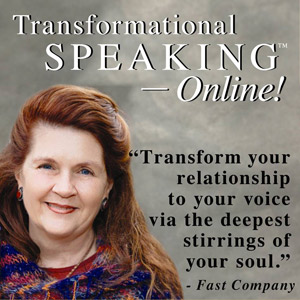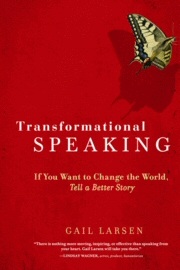Activism + Artistry: Speaking Out for Change
This month in Vancouver, 17 inspiring people attended my Speak Out! workshop to build their speaking skills to catalyze personal and planetary change. Ten ideas emerged to support you when you are faced with an audience whose worldview and values are markedly different from your own.
1. Recognize that if everyone is already on board with you, you are preaching to the choir. It’s uplifting to find audiences that respond, of course. But often your mission requires that you open up new avenues of understanding and potential support. The first step in change is beginning a conversation that introduces a new framework or language. Consider the changes in your own awareness over time and honor what it takes to move to a different point of view.
2. Learn to tell the truth without blame or judgment, a principle from The Four Fold Way by Angeles Arrien. When you judge someone, it comes through and shuts down communication – that’s just as true in public speaking as it is at home! Move beyond right and wrong and address the problem rather than blame the person.
3. Understand that “facts” and statistics are often manipulated. People can argue with your data, but they can’t argue with the truth of your experience. The undeniable encounter with a real person with a real story that contradicts what we think we know can cause us to open up our hearts and our thinking. So share your stories with their full authenticity and impact, thereby making the human connection that sets the stage for your information to be more readily heard.
4. Learn about your audience in advance and demonstrate your competence by being current on what is relevant to them. Don’t go beyond your area of expertise or fake it if you’re asked a question you can’t answer. You build more credibility by saying, “I don’t know the answer to that.” Follow-up later with a thoughtful response if you believe it would be constructive and build the relationship.
5. Include yourself in the problem. For example, if your issue is global warming, acknowledge your concern about your own environmental impact. If you refer to your impact as your “carbon footprint,” recognize you may be introducing new terminology to your audience, so explain it and refer them to a website such as https://www.carbonfootprint.com/calculator.html to learn more and make their own assessment.
6. Read Power vs. Force by David Hawkins. Whether or not you accept as scientific fact his calibration of the energetic vibration of various worldviews and states of being, it’s a reminder to use the power of higher values with people who can hear you rather than the force of argument with those who can’t. Note where your spirit remains strong so you can work with joy. Your energy is a precious resource in the work of change.
7. Stay inspired by people and practices that nourish you. A member of our group pointed out that an advertising message has to be heard 50 times before someone makes a decision to buy, so don’t underestimate your part in establishing the foundation for a later tipping point. When you’re feeling alone and unheard, seek support.
8. Acknowledge that you hold a different perspective. A compelling speech meets the audience where they are. If it is clear you hold an opposing viewpoint, say so and tell the story of how you came to your current thinking.
9. Don’t use jargon – language that is familiar to you but not to those who are beginning to learn about your cause. People will shut down and stop listening. Nor do they want to ask questions when they don’t understand your terminology for fear of looking uninformed or stupid. (Refer to #5 above.)
10. If you are concerned about “corporate” response, remember that corporate audiences are comprised of individuals. Ipsos, the global market research firm, surveyed senior managers in Canada and found that 82% are seeking new jobs, so lack of alignment with organizational values is likely at play. Rather than expecting to reach everyone, provide a starting point for change with specific steps an individual can take on his or her own. People want to know what they can do, so give them something immediate to say yes to.
As you work for change, trust that what you do matters, whether or not you see immediate results. No one else has the same configuration of life experience and perspective that you hold. This is your “original medicine,” no where else duplicated. Your voice is needed on issues that impact our sacred earth and determine our collective future. Martin Luther King, Jr., did not change history by saying, “I have a complaint!” notes human rights leader Van Jones. You can inspire with a vision of the dream you hold for a better world, and then follow with the practical steps we can take to get there. It is the foundation for building support, partnerships, and coalitions that count.
Please send your questions and thoughts for future e-letters to [ email ]. Thank you!
PERMISSION TO REPRINT: You may reprint any items from “Real Speaking Power Points” in your own print or electronic newsletter. Please include the following paragraph:
Reprinted from “Real Speaking Power Points” a free e-letter by Gail Larsen featuring insights and ideas to enhance your public speaking and communications. Subscribe at https://www.realspeaking.net.
© October 2006 Gail Larsen, 505-986-8650





